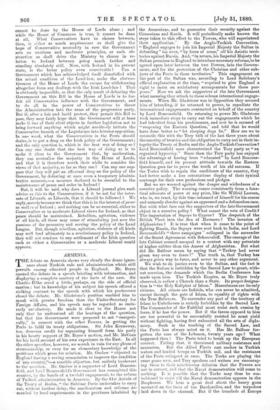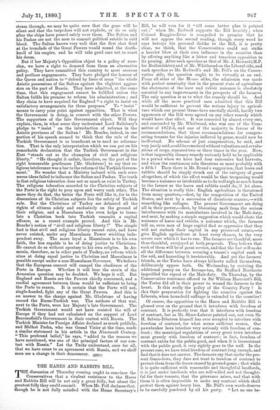ARMENIA.
THE debate on Armenia shows very clearly the dense ignor- ance about Turkish rule and administration which still prevails among educated people in England. Mr. Bryce opened the debate in a speech bristling with information, and displaying a complete mastery of the facts of the case. Sir Charles Dilke erred a little, perhaps, on the side of official caution ; but in knowledge of his subject his speech offered a striking contrast to the speech with which his predecessor closed the debate. Mr. Gladstone's position enabled him to speak with greater freedom than the Under-Secretary for Foreign Affairs, and his speech may be regarded as emin- ently satisfactory. He made it clear to the House not only that he understood all the bearings of the question, but that the Government were prepared to act "energeti- cally," in concert with the other Powers, in getting the Porte to fulfil its treaty obligations. Sir John Kennaway, too, deserves credit for separating himself from his party in his hearty support of Mr. Bryce's motion, and Mr. McCoan for his lucid account of his own experience in the East. In all the other speeches, however, we search in vain for any gleam of statesmanship, or even for an elementary knowledge of. the problems which press for solution. Mr. Onslow "objected to England having a roving commission to improve the condition of any country,"—a sensible objection, but entirely irrelevant to the question. Mr. Onslow is a supporter of Lord Beacons- field, and Lord Beaconsfield's Government has committed this country, by the bonds of a twofold engagement, to the reform of Turkish administration in Armenia. By the 61st Article of the Treaty of Berlin, "the Sublime Porte undertakes to carry out, without further delay, the amelioration and reforms de- ' mended by local requirements in the provinces inhabited by
the Armenians, and to . guarantee their security against the Circassians and Kurds. It will periodically make known the steps taken to this effect to the Powers, who will superintend their application." By the Anglo-Turkish Convention, "England engages to join his Imperial Majesty the Sultan in defending" for ever, "by force of arms," all his Asiatic terri- tories against Russia. And, "in return, his Imperial Majesty the Sultan promises to England to introduce necessary reforms, to be agreed upon later between the two Powers, into the Govern- ment, and for the protection of the Christian and other sub- jects of the Porte in these territories." This engagement on the part of the Sultan was, according to Lord Salisbury's official explanation at the time, "required to give England a right to insist on satisfactory arrangements for these pur- poses." Now we ask the supporters of the late Government what meaning they attach to these solemn international engage- ments. When Mr. Gladstone was in Opposition they accused him of intending, if he returned to power, to repudiate the international engagements contracted on behalf of the country by Lord Beaconsfield. On returning to power Mr. Gladstone took immediate steps to carry out the engagements which he had inherited from his predecessors, and now he is accused of "reopening the Eastern Question," and told that he would have done better to "let sleeping dogs lie." How are we to reconcile this with the Tory talk of the last three years about the sanctity of treaties and the obligation to carry out in their in- tegrity the Treaty of Berlin and the Anglo-Turkish Convention? Lord Beaconsfield once characterised the Tory party as "an organised hypocrisy." Since then the Tory party has enjoyed the advantage of having been "educated" by Lord Beacons- field himself, and its present attitude towards the Eastern Question goes far to prove the truth of his old sarcasm. If the Tories wish to regain the confidence of the country, they bad better make a less ostentatious display of their cynical contempt for their own professions and pledges.
But we are warned against the danger and wickedness of a coercive policy. The warning comes consistently from a fana- tical advocate of peace at any price, like Sir Wilfrid Lawson, who is, we trust, by this time ashamed of himself for his coarse and unmanly slander against an oppressed and a defenceless race. But with what face can the supporters of the late Government object to a coercive policy ? What meant the vote of Credit? The importation of Sepoys to Cyprus ? The despatch of the British Fleet into the Sea of Marrnora ? The invasion of Afghanistan ? It is true that when it came to the point of fighting Russia, the Sepoys were sent back to India, and Lord Beaconsfield's "three campaigns" collapsed in the surrender of the Secret Agreement with Schouvaloff. The courage of the late Cabinet seemed unequal to a contest with any potentate of higher calibre than the Ameer of Afghanistan. But what did Mr. Balfour mean by saying that "Turkey had never given way even to force ?" The truth is, that Turkey has always given way to force, and never to any other argument.
We wish to do justice even to the Sultan, and the fact is that the Sultan is forbidden by the Sacred Law to grant, with- out coercion, the demands which the Berlin Conference has made upon him. The Turkish Empire, as Mn. Bryce truly observed, is rather a Church than a State. Its proper designa- tion is "the Holy Kaliphat of Islam." Mussulmans are its only citizens. All others are Infidels, who can never be admitted, except through the gate of Islam, to equality of rights with the True Believsrs. To surrender any part of the territory of Islam to Unbelievers is strictly forbidden by the Sacred Law. The Commander of the Faithful must resist such cession by force, if he has the power. But if the forces opposed to him are too powerful to be successfully resisted he must yield without fighting, having first exhausted all the arts of diplo- macy. Such is the teaching of the Sacred Law, and the Porte has always acted on it. Has Mr. Balfour for- gotten the case of the Lebanon, twenty years ago ? What happened then ? The Porte tried to break up the European concert. Failing that, it threatened military resistance and massacres. But the Allied Fleets cast anchor in Turkish waters and landed troops on Turkish soil, and the resistance of the Porte collapsed at once. The Turks are playing the same game now, and Tory speakers and writers are encourag- ing them in their mischievous delusion that the Powers are not in earnest, and that the Naval demonstration will come to nothing. It is possible that the Turks may thus be em- boldened to resist till the Naval demonstration appears in the Bosphorus. We hear a great deal about the heavy guns mounted on the forts of the Dardanelles, and the torpedoes laid down in the channel. But if the ironclads of Europe
steam through, we may be quite sure that the guns will be silent and that the torpedoes will not explode, or do so only after the ships have passed safely over them. The Sultan and his Pashas are not the men to commit political suicide in cold blood. The Sultan knows very well that the first shot fired at the ironclads of the Great Powers would sound the death- knell of his empire, and he will take good care not to court his doom.
But if her Majesty's Opposition object to a policy of coer- cion, we have a right to demand from them an alternative policy. They have committed this country to most onerous and perilous engagements. They have pledged the honour of the Queen and nation to "defend by force of arms" the whole Asiatic possessions of the Sultan against the slightest aggres- sion on the part of Russia. They have admitted, at the same time, that this engagement cannot be fulfilled unless the Sultan fulfils his promise to reform his administration ; and they claim to have acquired for England "a right to insist on satisfactory arrangements for these purposes." To " insist " means to carry your point against opposition. That is what the Government is doing, in concert with the other Powers. The supporters of the late Government object. Will they explain, then, in what sense they understand Lord Salisbury's pledge to " insist " on the introduction of reforms in the Asiatic provinces of the Sultan ? Mr. Bourke, indeed, in one portion of his speech seemed to think that the rule of the Turkish Government is so beneficent as to need no reforma- tion. That is the only interpretation which we can put on his remarkable declaration that the Turkish Government in the East "stands out as the champion of civil and religious liberty." "He thought it unfair, therefore, on the part of the right honourable gentleman [Mr. Gladstone] to say that re- ligious intolerance was a bar to the reform of the Turkish Govern- ment." No wonder that a Ministry imbued with such erro- neous ideas failed to influence the Sultan and Pashas. The truth is that religious toleration does not so much as exist in Turkey. The religious toleration accorded to the Christian subjects of the Porte is the right to prey upon and worry each other. The more they do that, the better the Porte will like it, for in the dissensions of its Christian subjects lies the safety of Turkish rule. But the Christians of Turkey are debarred all the rights of citizens solely and exclusively on the ground of their religion, and a Mussulman who even helps to trans- late a Christian book into Turkish commits a capital offence, as a recent example proved. And this is Mr. Bourke's notion of "civil and religious liberty I" The simple fact is that civil and religious liberty cannot exist, and have never existed, under any Mussulman Power wielding inde- pendent sway. The more loyal a Mussulman is to his own faith, the less capable is he of doing justice to Christians. He cannot do so without apostasy to his own religion. In Ar- menia, therefore, as in other parts of Turkey, no reform which aims at doing equal justice to Christian and Mussulman is possible except under a non-Mussulman Governor. We believe that the European concert will compel the obedience of the Porte in Europe. Whether it will bear the strain of the Armenian question may be doubted. We hope it will. But England and Russia are the Powers chiefly concerned, and a cordial agreement between them would be sufficient to bring the Porte to reason. It is certain that the Porte will not, single-handed, fight any of the Great Powers. And this is .an answer to the charge against Mr. Gladstone of having caused the Russo-Turkish war. The authors of that war, next to the Porte, were her Majesty's late Government. The Turkish Government would not have resisted the will of Europe if they had not calculated on the support of Lord Beaconsfield's Government in their contest withRussia. The Turkish Minister for Foreign Affairs declared as much publicly, and Midhat Pasha, who was Grand Vizier at the time, made a similar statement in his article in the Nineteenth Century. "This profound belief," he says, "added to the reasons we have mentioned, was one of the principal factors of our con- test with Russia." Let the Turks understand, once for all, that we have come to an agreement with Russia, and we shall soon see a change in their demeanour. /awn



































 Previous page
Previous page